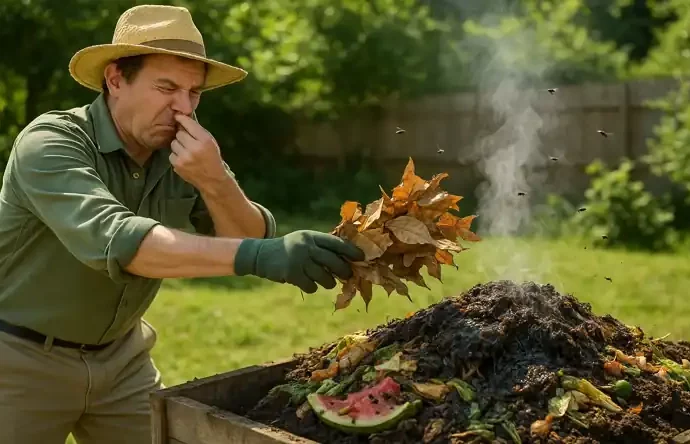Introduction Composting is a rewarding way to turn kitchen scraps and garden waste into rich, fertile soil. However, even the most experienced composters run into issues from time to time. A pile that smells bad, feels too wet, or has dried out completely can slow down decomposition and discourage your composting efforts. The good news
Introduction
Composting is a rewarding way to turn kitchen scraps and garden waste into rich, fertile soil. However, even the most experienced composters run into issues from time to time. A pile that smells bad, feels too wet, or has dried out completely can slow down decomposition and discourage your composting efforts. The good news is that these problems are easy to fix once you understand the cause. With a little adjustment, you can restore balance to your compost pile and keep it working efficiently.
Understanding the Basics of Healthy Compost
A healthy compost pile needs the right mix of carbon-rich materials (browns), nitrogen-rich materials (greens), air, and moisture. Browns include dry leaves, cardboard, and wood chips, while greens include vegetable scraps, coffee grounds, and grass clippings. The ideal ratio is roughly 3 parts browns to 1 part greens. Your pile should also feel like a damp sponge—moist but not soggy—and have enough air flow to keep the microorganisms inside working efficiently.
Compost Troubleshooting: Fix Smelly, Wet, or Dry Piles

Image by: Yandex.com
Problem 1: Smelly Compost
Cause: A foul odor is usually caused by too many wet, nitrogen-rich materials and not enough dry, carbon-rich materials. Without enough airflow, your compost becomes anaerobic, meaning it decomposes without oxygen, producing an unpleasant smell.
Solution:
- Add more browns like shredded cardboard, straw, or dried leaves to absorb excess moisture.
- Turn the pile more often to introduce oxygen.
- Avoid adding meat, dairy, or oily foods, which can worsen smells.
Regular mixing ensures oxygen reaches all parts of the pile, speeding up decomposition and reducing odor.
Problem 2: Compost is Too Wet
Cause: Excess water often comes from heavy rain or adding too many moisture-rich greens like fruit scraps and grass clippings. A soggy pile lacks air flow, which slows down the composting process and can lead to unpleasant smells.
Solution:
- Cover your compost with a tarp during rainy weather.
- Mix in dry browns such as sawdust, shredded newspaper, or dried leaves to soak up moisture.
- Turn the pile more frequently to improve aeration.
Keeping your compost slightly damp but not dripping is the key to preventing excess moisture.
Problem 3: Compost is Too Dry
Cause: Hot weather, too many dry materials, or lack of watering can cause your compost pile to dry out. Without moisture, the microorganisms that break down organic matter slow down or stop working altogether.
Solution:
- Lightly water your compost pile until it feels like a damp sponge.
- Add more nitrogen-rich greens like food scraps or fresh grass clippings.
- Cover the pile with a tarp to retain moisture during hot, dry weather.
A consistent moisture level ensures faster decomposition and healthier compost.
Problem 4: Compost is Not Heating Up
Cause: Compost needs the right balance of greens, browns, and moisture to generate heat. If it’s not warming up, it could mean the pile is too small, too dry, or lacking nitrogen-rich materials.
Solution:
- Add more greens to provide nitrogen for microbial activity.
- Increase the pile size to at least 3×3 feet to retain heat.
- Moisten the pile if it’s too dry and turn it regularly for better oxygen flow.
Active heat speeds up decomposition and kills weed seeds or harmful bacteria.
Problem 5: Compost is Attracting Pests
Cause: Food scraps that are left uncovered or contain meat, dairy, or oily foods can attract rodents, raccoons, and insects.
Solution:
- Avoid adding animal-based products to your compost.
- Bury food scraps deep within the pile.
- Use a secure compost bin with a lid if pests are a problem in your area.
Properly covering food scraps helps deter unwanted visitors.
Problem 6: Compost is Taking Too Long to Finish
Cause: Decomposition slows down if there’s not enough oxygen, moisture, or the right material balance.
Solution:
- Turn the pile more often to improve aeration.
- Adjust the balance of greens and browns to maintain an active composting process.
- Keep the pile moist but not soggy.
Regular maintenance ensures you have finished compost in a shorter time frame.
Tips for Maintaining a Healthy Compost Pile
- Chop large materials into smaller pieces for faster breakdown.
- Monitor moisture regularly, especially during seasonal changes.
- Keep a compost thermometer handy to track heat levels.
- Add a mix of materials every time you feed the pile.
These habits prevent common problems and keep your compost pile productive year-round.
Seasonal Considerations for Composting
- Summer: Water the pile more often to prevent it from drying out.
- Winter: Insulate with straw or leaves to retain heat in cold weather.
- Rainy Season: Cover the pile to prevent excess water from slowing decomposition.
Adapting your compost care to the season ensures steady progress.
Conclusion
Composting is a simple yet powerful way to reduce waste and enrich your garden, but problems like bad smells, sogginess, or dryness can slow your progress. The key to success is balance—ensuring the right mix of greens and browns, maintaining proper moisture, and providing good airflow. By addressing issues quickly and making small adjustments, you can keep your compost pile healthy and productive. With a little care and attention, you’ll turn waste into nutrient-rich soil that benefits both your plants and the environment.

















Leave a Comment
Your email address will not be published. Required fields are marked with *